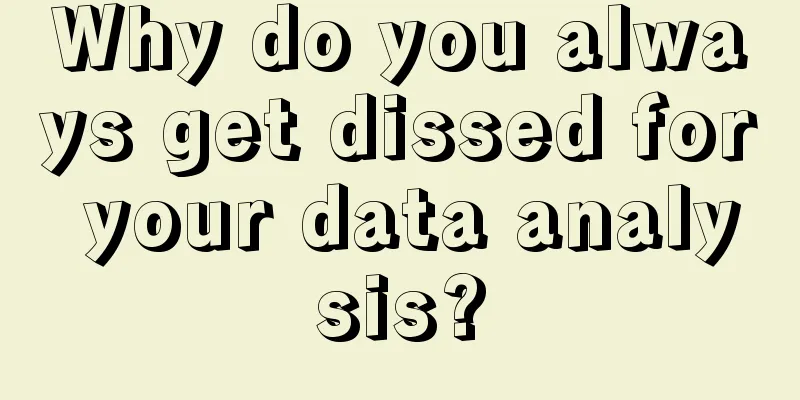What personality types are suitable for being a data analyst?

We all know that personality is actually your subconscious reaction when facing something . For example, if you are thrown among strangers and someone suddenly talks to you, will you respond to him? This is related to your introversion or extroversion in personality. If you are an extrovert , your first reaction might be to pick up his words and continue the conversation. You might even think, "Oh, finally there is someone to chat with, how happy, right?" But an introvert might first think, "Oh, how do I respond to this?" You might be nervous about how to answer. This kind of personality has nothing to do with your knowledge level or your experience. It is just your subconscious first reaction. Therefore , it is difficult to teach and change. If you find a job that is not suitable for you, you will suffer a lot and it will be difficult for you to achieve good results. It's like if you ask an introvert to do sales, it's hard for him to do well, and he will suffer every day when doing this job. Next, let’s talk about what kind of personality is suitable for being a data analyst. 1. MBTI distribution around meThere are many ways to measure personality, such as MBTI, DISC, and many other testing methods, which I will not list one by one. Among them, I think MBTI is more comprehensive, and many people around me have done it, so I know what kind of personalities the data analysts around me have. So I will take MBTI as an example and share it with you. MBTI mainly examines personality through four dimensions, namely:
There are two types in each dimension, so there are four dimensions in total. After the combination, 16 personality types will be generated. If these 16 personality types are randomly distributed, then the proportion of each personality should be 6.25%. According to my observations, a large number of data analysts around me are ISTJs, or logisticians, accounting for 30 to 50 percent. Because I have tested it in two companies, the proportions of these two companies are slightly different, but both are very high. So to sum up, which characteristics among these four types are more important? 2. What personality traits do data analysts need?I summarized it. First of all, I and E don't matter . In other words, there is no clear distinction between introversion and extroversion. Both are acceptable. I looked at the test questions and found that these questions are biased towards Western social scenes. Sometimes I answered that I personally think I am quite extroverted, but in the end I was still introverted. I think this introversion and extroversion may be the judgment standard of Westerners. Maybe Chinese people think I am already very extroverted. In Westerners, I am still relatively introverted. I think this may not be important. The second is S and N, which means reality and perception. For this type, the priority is s, but it can be n . The third is T and F, which means thinking and feeling. This dimension is particularly important. For data analysts, it must be T, not F. The last one is J and P, which means judgment and perception. For data analysts, it is best to judge rather than perceive, that is, try to be J rather than P. So, if we combine these four dimensions, we can find that we can rank different personalities. If we remove extroversion and introversion, we are actually left with eight types. Among these eight combinations, as we mentioned before, it must be T and not F, so I think all those with F are not suitable to be data analysts . Why do I say that? Because F stands for emotion , he draws conclusions based on emotion and social relationships instead of logic . This tendency can easily lead to illogical conclusions. This conclusion is very prone to problems. The essence of the position of data analyst is that all the data conclusions he reports must be accurate and objective. If you draw conclusions based on emotion, the reliability of your conclusions will be greatly reduced. Your leader cannot manage this kind of personality preference, because you will subconsciously feel this way. Of course, there is also a saying that there are two types of personality: life personality and work personality . That is, you can show a completely different personality at work. There are always exceptions. If you are really an F personality and you really want to be a data analyst, is it possible? I think it is completely possible, so my sharing is not to discourage you, but to tell you that you may be very tired on this road. Of course, if you really love it, you will definitely be able to move forward. Passion is always the best direction. 1. Most suitable personality: STJThe "s" here stands for attention to details and attention to real facts. The t stands for using logic to make decisions . Stick to your own point of view and don't let your emotions get in the way. This is actually the analysis in data analysis. J represents the clear standards and progress in judging things . This is mainly reflected in the workplace. You have a certain method to promote a matter and you can get things done. You have a certain degree of professionalism in the workplace. The STJs around me are all ISJs, and I haven't met any ESTJs yet. The type of ESTJ is called "General Manager", so it is possible that ESTJs do not bother to be data analysts, and they may prefer to be bosses, but I don't have any cases around me, so I can't evaluate this type. If you are stj, then congratulations, you are a natural data analyst and you are very suitable for this position. 2. Second Tier: NTJThe second echelon is ntj. The difference between it and STJ is that s becomes n . What are the characteristics of n? n is more abstract, he likes conceptual things , he likes to do some global thinking. He is not bound by existing facts and data. According to my observation, people from NTJ prefer to do things at a macro level . They like to use business models, user psychology, and other knowledge, such as marketing, to find conclusions that are helpful to the business. So when NTJ is doing analysis, he doesn't particularly care about the accuracy of the data . He prefers to build a more complete analysis framework and drill down according to this analysis framework. As for the people from STJ, they are better at following the original analysis framework step by step, and they can ensure that each step in the middle can be strictly implemented according to regulations. So NTJs are more divergent, but they have a harder time dealing with very detailed data, such as business reports, because NTJs don’t like to pick up decimal points. For example, if a number is a few dollars different from the number in the online report, the error may be only 0%. In the eyes of NTJs, these are exactly the same, because 0% actually has no effect on the conclusion of the business. However, some positions require that every number must be the same, so NTJs are more suitable for business BI, because they only need a relatively general business direction and do not need to pick up details. Why do I know so much? Because I am an INTJ. I don’t like to play with words or numbers. I like to think about a new problem and how to solve it. By the time I had built my analytical framework, I had already lost all interest in this issue because my personality preference is for the big framework. 3. The third tier: NTP or STPWhat about the third tier? It is ntp or stp , which are not much different from each other. These two types are in the third tier, because P is perception, it will perceive the surrounding environment and make a decision at the end . This type of person will mainly affect your output efficiency when doing analysis, because this type of person often encounters a problem, that is, once he does the analysis, he will find that the conclusion of the analysis is not perfect. He wants to continue to drill down, and after drilling down, he finds new problems and wants to draw new conclusions, so he does not come up with a work that can be submitted until the end. But for data analysts, we have a strong sense of deadlines . For example, when should you produce your monthly report? It must come out. Even if your final output is not good, it doesn't matter, because completion is more important than perfection. If you pursue perfectionism and must come up with the best, then you may become the weak link in your corporate cooperation and the reason why the entire project cannot be carried out. Then we can also take a look at the type P. What is its representative noun? ISTP means connoisseur. ESTP means entrepreneur. As soon as you hear these names, you will know that they don’t have a particularly clear time limit. They all have plenty of time to make choices. They are different from data analysts like us. 3. SummaryAfter talking about several types, I still need to give some final tips. First of all , these conclusions are based on cases around me and my understanding of MBTI. They are not absolutely authoritative theories . Secondly , personality can change , especially for many college students, your personality has not yet been finalized, as you gain more experience, some of your subconscious judgments can change. I am sharing these things today in the hope that they can help those who are hesitant about whether to be a data analyst, and who do not particularly like it. I have my own things I want to do, so what about these people? I will give you a reference. What about your personality? If it is not suitable for this position, can you cut your losses in time? Because you are not so passionate about this job now, and your personality is not very compatible, then it will be tiring for you to do this job. It is better to follow your heart and see what you really want to do? Of course, if you are born with the talent of a data analyst, such as an istj, it does not mean that you will definitely be able to do well , because personality is only one aspect, and there are still many related knowledge, skills and experiences that you still need to work hard to bless. Okay, that’s all for today, bye. Author: Jason Source: WeChat public account: "Sanyuanfangcha" |
>>: With their stingy daily lives, the dark horse couple makes money on the Internet
Recommend
What are the main cross-border payment institutions?
If domestic merchants want to do cross-border busi...
Will there be any connection if a Shopify store is frozen? How to prevent it?
Shopify is also a cross-border e-commerce store. I...
In 2023, who will make a fortune in the beauty industry?
This article starts with the development of KOLs i...
How to distinguish Amazon advertising orders from organic orders? What are the tips?
As the Amazon platform continues to grow, more and...
Short drama CPS, 10 million views a day
The popularity of short dramas is growing, and the...
Can Amazon stores be closed? Why can’t stores be run successfully?
On the platform of Amazon, a global e-commerce gia...
Understand in 5 steps - How to create a closed loop of private domain transactions worth tens of millions!
In today's business environment, the importanc...
How does Amazon set up the pre-sale model? What are the pre-sale rules?
With the rapid development of the e-commerce indus...
Lei Jun wants to bring goods, but the conditions do not allow it?
Lei Jun's first live streaming show was a cold...
How long does it take to prepare goods on Amazon? How to prepare goods?
To be a good seller, we must first manage the stor...
Can mainland China shop on Amazon? How to shop on Amazon in the United States?
For consumers in mainland China, they can indeed s...
AI products quietly compete for super entrance
This article analyzes how AI products can enhance ...
How to use Shopee Zhixia? What are the tips?
Since the launch of Shopee cross-border e-commerce...
10 Douyin travel products with over 100,000 users, all of which are money-making opportunities
Introduction: Spring outing season is here! This a...
The longest Double 11 in history
On October 14, this year's Double 11 event kic...









